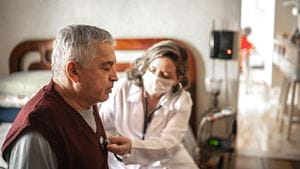
While heart disease continues to lead the nation as the number one cause of death, there are many ways to prevent and treat it before it becomes fatal. Cardiologists in the Sands-Constellation Center for Critical Care, specialize in treating patients with heart failure.
We caught up with Dr. Elizabeth C. Lee, a Rochester Regional Health heart failure specialist, to discuss more about the work she’s doing.
Heart failure specialists have an extra year of training beyond cardiology, so there’s a particular focus on advanced therapies and medications beyond general cardiology, as well as heart transplant options for patients with heart failure.
We have pre- and post-transplant expertise and we also take care of patients implanted with a heart pump (LVAD) pre- and post-. We are an LVAD (left ventricular assist device) center, so those patients are closely followed by our clinic. We also treat complicated heart failure and patients who need extra assistance in their medication regimen.
Part of our expertise is being up-to-date on all the newest medications. That’s our wheelhouse in the outpatient realm, whereas in the inpatient services, our team is involved in caring for patients suffering from shock or critically ill with heart failure. I also work with patients who have been diagnosed with sarcoidosis, an inflammatory disease that affects multiple organs (primarily the lungs).
Congestive heart failure is the umbrella term for all types of heart failure. Left-sided heart failure is either going to be heart failure with reduced ejection fraction, also called systolic failure, or heart failure with preserved ejection fraction, also called diastolic failure. There is also right-sided or right ventricular (RV) heart failure, which usually occurs as a result of left-sided failure.
Our treatment options include medication and advanced therapies like IV medications, and surgical treatment via transplant or LVAD. It’s important to know which type of heart failure you’re dealing with as the medication regimen is different, but the symptoms can be overlapping.
Key symptoms are classically shortness of breath, especially during physical exertion, swelling of the legs or abdomen (bloating), feeling shortness of breath when you lay down to sleep, waking up short of breath or anxious, and nausea, after meals especially.
The number one cause of heart failure is coronary artery disease, so risk factors include high cholesterol, diabetes, and high blood pressure. In terms of age demographics, heart failure risk does increase beyond age 40, but heart failure can really affect a patient at any age. Genetic or familial causes of heart failure can affect someone as young as their 20s. Women may experience heart failure postpartum, even without heart failure risks before pregnancy. Older women are more at risk for heart failure with preserved ejection fraction than men are.
The best and easiest prevention stems from a healthy diet and getting plenty of exercise. A low salt diet will limit high blood pressure risk, and we recommend that patients walk or move in some way for 30 minutes every day. A sedentary lifestyle is a huge strain on the body and affects heart health significantly.
A heart healthy diet is the hardest thing for people to change because they grow up eating a certain way and it usually brings them comfort. Then, they’re more reticent to change things up. Adding tofu, legumes, chicken, and fish in place of beef or pork in your weekly meals is a good start. One night a week, try to eliminate meat and begin to work in a plant-based protein instead. The best heart healthy diet is vegan, which is hard for people to achieve, so I try to meet people where they are and take it from there.